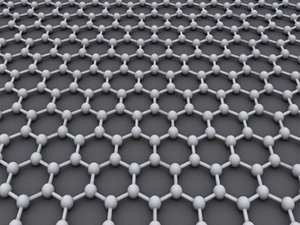



Date:27/07/11
 Scientists at the University of Manchester are working on a material called Graphene, which they claim could revolutionise the IT and electronics industry. The material, which is just one atom thick, could see smartphones, tablets and PCs work much faster as a result of experiments that have shown high electron mobility through the material at room temperature. Graphene is made from carbon, and is considered a two-dimensional (2D) material as it is just one atom thick. The material was discovered by scientists at the University of Manchester in 2004 and Andre Geim and Konstantin Novoselov who worked with the material were awarded the Nobel Prize in Physics in 2010 "for their groundbreaking experiments" using the material. Professor Geim said of the electron mobility experiment: "The progress has been possible due to a quantum leap in the sample quality that could be produced at The University of Manchester."
Scientists at the University of Manchester are working on a material called Graphene, which they claim could revolutionise the IT and electronics industry. The material, which is just one atom thick, could see smartphones, tablets and PCs work much faster as a result of experiments that have shown high electron mobility through the material at room temperature. Graphene is made from carbon, and is considered a two-dimensional (2D) material as it is just one atom thick. The material was discovered by scientists at the University of Manchester in 2004 and Andre Geim and Konstantin Novoselov who worked with the material were awarded the Nobel Prize in Physics in 2010 "for their groundbreaking experiments" using the material. Professor Geim said of the electron mobility experiment: "The progress has been possible due to a quantum leap in the sample quality that could be produced at The University of Manchester."
World's thinnest material could transform electronics products
 Scientists at the University of Manchester are working on a material called Graphene, which they claim could revolutionise the IT and electronics industry. The material, which is just one atom thick, could see smartphones, tablets and PCs work much faster as a result of experiments that have shown high electron mobility through the material at room temperature. Graphene is made from carbon, and is considered a two-dimensional (2D) material as it is just one atom thick. The material was discovered by scientists at the University of Manchester in 2004 and Andre Geim and Konstantin Novoselov who worked with the material were awarded the Nobel Prize in Physics in 2010 "for their groundbreaking experiments" using the material. Professor Geim said of the electron mobility experiment: "The progress has been possible due to a quantum leap in the sample quality that could be produced at The University of Manchester."
Scientists at the University of Manchester are working on a material called Graphene, which they claim could revolutionise the IT and electronics industry. The material, which is just one atom thick, could see smartphones, tablets and PCs work much faster as a result of experiments that have shown high electron mobility through the material at room temperature. Graphene is made from carbon, and is considered a two-dimensional (2D) material as it is just one atom thick. The material was discovered by scientists at the University of Manchester in 2004 and Andre Geim and Konstantin Novoselov who worked with the material were awarded the Nobel Prize in Physics in 2010 "for their groundbreaking experiments" using the material. Professor Geim said of the electron mobility experiment: "The progress has been possible due to a quantum leap in the sample quality that could be produced at The University of Manchester."
Views: 943
©ictnews.az. All rights reserved.Similar news
- Mobile operators of national market to reduce roaming tariffs
- Iran vows to unplug Internet
- China Targeting Telecoms in Corruption Probe
- Bangladesh to use electronic voting system for next elections
- Philippine IT sector to launch five-year digital strategy plan
- Russian Premier Vladimir Putin meets ITU Secretary-General Hamadoun Touré
- US lawmakers propose to regulate use of geolocation data
- Unlimited mobile data plans dying as telcos gear up for cloud future
- Europe at risk of falling behind US and Asia on 4G use
- Netherlands first to regulate on net neutrality
- Korean Co Takes Aim At Display Patents
- Regulators, Banks Look for IT Hires After Breakdowns
- Electron transactions spreading
- Schools in remote rural areas will connect to the single database via network without SIM
- Obama to Personally Tweet From Twitter Account





















